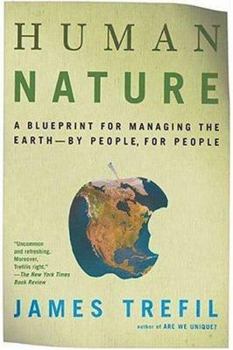Human Nature: A Blueprint for Managing the Earth--By People, for People
Select Format
Select Condition 
Book Overview
The author of Are We Unique? introduces his radical approach to the management of the environment, explaining how, by utilizing the power of science and a scientific approach to the environment, we... This description may be from another edition of this product.
Format:Paperback
Language:English
ISBN:0805078487
ISBN13:9780805078480
Release Date:May 2005
Publisher:Holt McDougal
Length:272 Pages
Weight:0.82 lbs.
Dimensions:0.7" x 5.8" x 9.0"
Related Subjects
Biological Sciences Conservation Ecology Engineering Environment Nature Nature & Ecology Science & MathCustomer Reviews
2 ratings
evolving relationship of humanity and the environment
Published by Thriftbooks.com User , 15 years ago
Professor Trefil's book engages the reader to think about the evolving relatioship between humans and the environment in light of new advances in science & technology. These advances can provide breakthroughs in medicine and environmental management, yet at the same time, can raise many ethical questions as to what the appropriate role of humaity should be with regard to "nature". Increasingly, whether we like it or not, Trefil argues, we are fast moving toward the day when we will completely "manage" the Planet. The author is genuinely concerned about Earth's future, yet challenges current environmental orthodoxy on a range of issues from biotechnolgy to the greenhouse effect. One of the things I liked best about Human Nature is the fact that it made me re-examine some of my previously held assumptions about the history of science and ecology and offered up a thoughtful and well argued position on where we might go from here.
Engaging discussion of planetary management issues
Published by Thriftbooks.com User , 19 years ago
The main title of this book, "Human Nature" is a bit misleading. What physics professor and scientific generalist James Trefil is really talking about is humans and nature, as he says in the Preface, and how to manage the planet (as in the subtitle). Trefil has a "benefits-to-humans" principle to guide us: "The global ecosystem should be managed for the benefit, broadly conceived, of human beings." (p. 13 and p. 218) Note well the qualification "broadly conceived." Trefil allows that benefits to humans might include "some sort of innate human attraction to complex natural ecosystems" and that we might "prefer scenery that contains both water and a variety of plants and animals." (pp. 214-215) However he goes on to say that his first reaction to "the heat, humidity, and discomfort" of a rainforest is to ask, "Why would anyone want to preserve THIS?" Why indeed? Well, because it's there. Because it's beautiful...etc. Trefil appreciates this answer but assigns a higher value to human utility than to human aesthetics. To be fair, however, his vision of a managed earth includes "both cities and wilderness areas." (p. 226) Nonetheless this book will offend environmentalists because of its industry-friendly tone (e.g., Part II is entitled "The Myths of Pop Ecology") and because Trefil occupies a middle ground between the extremes of a paved earth and a wilderness earth, and also because he assigns such a high value to human life as opposed to the lives of other creatures. Okay, to some specifics. His idea of the symbolic meaning of the Garden of Eden as a falling from grace is the standard model from Christianity; however a broader view sees it as the symbolic expression of the birth of human consciousness. We were "innocent" and then suddenly we saw that we were "naked." We became "conscious"--especially of our animal nature. More important than this difference of interpretation is his idea that we have taken ourselves out...of the process of natural selection--and [have] became something unique in the history of our planet." (p. 39) Clearly we are unique on this planet. However to imagine that we have somehow stepped out of the process of natural selection is presumptuous. Our culture--as amazing as it is--is nonetheless itself a product of natural selection. It cannot negate natural selection except in a purely local way. To appreciate this imagine that we have established colonies on the moon and Mars. Suppose then that the earth suffers some horrific "sterilizing" catastrophe, such as being hit by a gigantic meteor. The colonies on the moon and Mars will survive but earth-bound humans will probably go the way of the dinosaurs. This is natural selection at work. Beings with the ability to occupy niches away from planet earth will be selected in such natural events (including the microbes in and on their bodies) as opposed to those beings who lack such an ability. To make this even clearer, imagine the inhabitants of a simi




